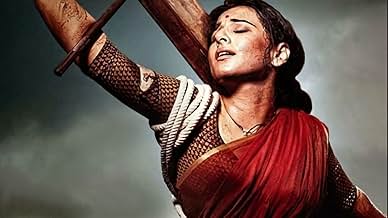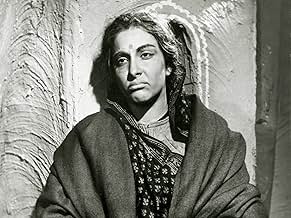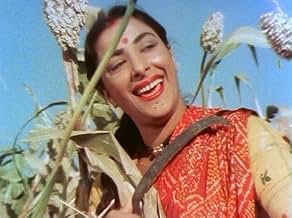Mother India
- 1957
- Tous publics
- 2h 52m
IMDb RATING
7.8/10
10K
YOUR RATING
In this melodrama, a poverty-stricken woman raises her sons through many trials and tribulations. But no matter the struggles, she always sticks to her own moral code.In this melodrama, a poverty-stricken woman raises her sons through many trials and tribulations. But no matter the struggles, she always sticks to her own moral code.In this melodrama, a poverty-stricken woman raises her sons through many trials and tribulations. But no matter the struggles, she always sticks to her own moral code.
- Nominated for 1 Oscar
- 8 wins & 2 nominations total
Rajendra Kumar Tuli
- Ramu
- (as Rajendra Kumar)
Kanhaiyalal Chaturvedi
- Sukhilala
- (as Kanhaiya Lal)
- Director
- Writers
- All cast & crew
- Production, box office & more at IMDbPro
Featured reviews
This was a movie about a strong woman of honor, Radha (Nargis) and her family, a usurious man, and the poor village they live in. The lender breaks villagers' backs by charging interest at such a high rate that they give something like 3/4 of their laborious harvest to the lender just to cover interest, keeping the debt in perpetuity. Almost nobody around can read, so the terms of the original contract are never clear. Though the situation keeps the woman's family downtrodden financially, she staunchly preserves her pride and dignity.
One of her sons, Birju (Sunil Dutt), is portrayed as always being a "problem" right from childhood, and while I could understand his rage against the moneylender, I found his vengeance hard to believe, especially the self-destruction that pitted him against his own family members. I like the ending and really laud Radha, who realized that one's dignity and honor is priceless and shouldn't be bartered away.
I found the film to be too long (it lasted around 3 hours); the story could have been just as compelling if it were an hour shorter. I would recommend the film and would rate it 6 on a scale of 10. I saw it as part of an Indian film festival, where it was projected on a movie screen from DVD and had English subtitles.
One of her sons, Birju (Sunil Dutt), is portrayed as always being a "problem" right from childhood, and while I could understand his rage against the moneylender, I found his vengeance hard to believe, especially the self-destruction that pitted him against his own family members. I like the ending and really laud Radha, who realized that one's dignity and honor is priceless and shouldn't be bartered away.
I found the film to be too long (it lasted around 3 hours); the story could have been just as compelling if it were an hour shorter. I would recommend the film and would rate it 6 on a scale of 10. I saw it as part of an Indian film festival, where it was projected on a movie screen from DVD and had English subtitles.
In this melodrama, a poverty-stricken woman raises her sons through many trials and tribulations. But no matter the struggles, always sticks to her own moral code.
"All Hindi films come from Mother India," said Javed Akhtar, the Hindi cinema poet, lyricist and scriptwriter. And of that I have no doubt. It does seem to be a very strong touchstone of Indian cinema, and one of the earliest films from India to get an international audience fawning.
But this is, perhaps paradoxically, the reason I do not care for the film. It is nothing that the Indian cinema has done ,but for some reason I just never care for Indian films, this one included. The grand, over-the-top nature of them, the singing where singing should not be by people who should not singing... the trend has gotten worse today, but I can see the germ here.
"All Hindi films come from Mother India," said Javed Akhtar, the Hindi cinema poet, lyricist and scriptwriter. And of that I have no doubt. It does seem to be a very strong touchstone of Indian cinema, and one of the earliest films from India to get an international audience fawning.
But this is, perhaps paradoxically, the reason I do not care for the film. It is nothing that the Indian cinema has done ,but for some reason I just never care for Indian films, this one included. The grand, over-the-top nature of them, the singing where singing should not be by people who should not singing... the trend has gotten worse today, but I can see the germ here.
I hate bollywood. But this isn't bollywood. This is epic, moving important filmmaking. The story is heartbreaking, the imagery is fabulous, even in Technicolor, and the music is, for once, really rather good. The songs do actually seem to signal major changes in the plot, rather than being tacked-on, globetrotting, multicostume sex-substitutes. Sadly for me, the DVD version I saw had subtitles for everything apart from the song lyrics, but the physical acting was so strong that it didn't matter. Yes, there are amateurish moments, and in the middle of the film, it takes some time off from the serious tone for an unnecessary extended piece about teasing girls. But that really is the only complaint I can make about this film. Essential viewing.
Nargis stars as a suffering woman, Radha, experiencing tragedy after tragedy, surviving it all. The first half of the film doesn't promise anything overly special. A poor community falls under the weight of a moneylender, Sukhilala. When Radha marries, her mother-in-law mortgages her farm to pay for the wedding and Radha's jewlery. Since the mother-in-law has no education whatsoever, Sukhilala, probably the only educated man in the village, is able to take advantage of her. When she challenges Sukhilala's claim, she can't do much to disprove their deal. This part of the story is pretty cliché, rather predictable and very questionable. Sukhilala is a fairly standard villain, very cartoonish and simplistic. The audience is programmed to hiss at his every appearance. The conflict is compelling, but I was hoping for something more complex. It is nice, I suppose, to see the system challenged, but the fact that the system is challenged does not necessarily mean that the film challenges the system in an insightful manner. In reality, the film's solutions to the problems are all melodramatics.
Luckily, something else is brewing in the film at this point. Radha has two sons, Ramu and Birju. The story starts to focus in on Birju, who is very obnoxious. His mother loves him dearly, spoils him, and he becomes simply evil. I should say at this point that the little kid who plays him as a child, Master Sajid, is very, very annoying, not to mention a terrible little actor. As an adult, Birju is a devil. Sukhilala still runs the place, and now Birju is big enough to do something about it. Thankfully, Birju is not made a hero. Well, perhaps an anti-hero, but at least we're spared him becoming an Indian Robin Hood as I expected. Complexities begin to develop in the way Sukhilala is depicted, and, while he's still the villain, the audience is no longer programmed to despise him on site. Radha has to both protect her son and stand up for what is right. The climax is so extremely impressive that I was almost convinced that the film was great.
Yet the film is not what I would call great as a whole. There were dozens of scenes that I loved, but, as the film goes on for three hours, there was plenty to dislike, as well. The fat and gristle detract. Did I mention there are great songs? Great indeed! I love Hindi music myself. The cinematography is also often exceptional. 8/10.
Luckily, something else is brewing in the film at this point. Radha has two sons, Ramu and Birju. The story starts to focus in on Birju, who is very obnoxious. His mother loves him dearly, spoils him, and he becomes simply evil. I should say at this point that the little kid who plays him as a child, Master Sajid, is very, very annoying, not to mention a terrible little actor. As an adult, Birju is a devil. Sukhilala still runs the place, and now Birju is big enough to do something about it. Thankfully, Birju is not made a hero. Well, perhaps an anti-hero, but at least we're spared him becoming an Indian Robin Hood as I expected. Complexities begin to develop in the way Sukhilala is depicted, and, while he's still the villain, the audience is no longer programmed to despise him on site. Radha has to both protect her son and stand up for what is right. The climax is so extremely impressive that I was almost convinced that the film was great.
Yet the film is not what I would call great as a whole. There were dozens of scenes that I loved, but, as the film goes on for three hours, there was plenty to dislike, as well. The fat and gristle detract. Did I mention there are great songs? Great indeed! I love Hindi music myself. The cinematography is also often exceptional. 8/10.
10shariqq
Mother India sits right at the top and shares the seat with just a handful of other movies as one of the best films ever made in Indian Film History. Deservedly, it also garnered an Oscar Nomination for Best Foreign Film - a first for Bollywood. Need I say more? Let me try...
Five years after her wedding, Radha, a regular village girl finds she has been abandoned by her husband (who leaves her in despair) and left to cope with his never-ending debt to Shuki Lal, the village "Munshi". To feed her children, Radha toils like a farm-animal and is able to save just enough food to eventually bring up her children. The injustice to and torture of their mother is interpreted in opposite ways by her children: while the elder Ramu is humble and just, the younger Birju who seethes with hatred for Sukhi Lal turns outlaw. While Radha tries to bring back Birju with love, Birju plans to finish Sukhi Lal's debt once and for all.
Mehboob Khan had made some good movies in his career, including a milestone first all-colour (technicolor) Bollywood feature. But nothing could have hinted at the brilliance to come in his waning years. Defying a very many stereotypes, his was the first major Hindi film with a female protagonist, a cowardly abandoning husband (how RajKumar, men of men, agreed for that role is another story), no definitive hero-heroine pairs, etc. He tells the 172-minute story in flash-back as a memory of an old Radha inaugurating irrigation canals in her village. Taking his titular heroine through happiness, desolation, compulsion and resignation, he transformed box-office darling Nargis into an actress nothing short of a legend. We see her go from an innocent bride to an anguished mother to a revered "Mother" of the village.
Nargis herself is most remembered for this career-defining and image-breaking portrayal (soon after which she married Sunil Dutt, who portrayed her bitter son Birju*). Sunil Dutt was a very under-rated actor, for the simple reason that all his great performances were never title characters, and were over-shadowed by more famous co-actors. His Birju is played with such realism and conviction that even today many comedians mimicking Sunil Dutt are actually mimicking Birju.
The director's production team does work beyond their era and workstyle to create the look of the people and place over time. From famine to flood for the backdrop, youth to old-age for Radha and from bright to dirty earthen to faded colours, the team wins complete involvement of the audience by filling our visual and audio sense with realism just next to reality. The director chose to spend more of his limited budget on these aspects, and in turn had to sacrifice on the equipment he could use to capture the sights and sounds that were being realised: the movie was made on 35mm and mono-sound.
Surprisingly, something I have noted as not being mentioned anywhere in literature connected to this movie is how without obviously being so, Mehboob created the most patriotic of Indian movies. The only give-away is in his choice of title Mother India. Depicting his motherland as a repressed and abandoned woman, and her children as peace-loving Gandhi-Ramu or rebellious Bose-Birju, Mehboob layers his movie with such fierce passion, it is impossible not to be overwhelmed by it.
Five years after her wedding, Radha, a regular village girl finds she has been abandoned by her husband (who leaves her in despair) and left to cope with his never-ending debt to Shuki Lal, the village "Munshi". To feed her children, Radha toils like a farm-animal and is able to save just enough food to eventually bring up her children. The injustice to and torture of their mother is interpreted in opposite ways by her children: while the elder Ramu is humble and just, the younger Birju who seethes with hatred for Sukhi Lal turns outlaw. While Radha tries to bring back Birju with love, Birju plans to finish Sukhi Lal's debt once and for all.
Mehboob Khan had made some good movies in his career, including a milestone first all-colour (technicolor) Bollywood feature. But nothing could have hinted at the brilliance to come in his waning years. Defying a very many stereotypes, his was the first major Hindi film with a female protagonist, a cowardly abandoning husband (how RajKumar, men of men, agreed for that role is another story), no definitive hero-heroine pairs, etc. He tells the 172-minute story in flash-back as a memory of an old Radha inaugurating irrigation canals in her village. Taking his titular heroine through happiness, desolation, compulsion and resignation, he transformed box-office darling Nargis into an actress nothing short of a legend. We see her go from an innocent bride to an anguished mother to a revered "Mother" of the village.
Nargis herself is most remembered for this career-defining and image-breaking portrayal (soon after which she married Sunil Dutt, who portrayed her bitter son Birju*). Sunil Dutt was a very under-rated actor, for the simple reason that all his great performances were never title characters, and were over-shadowed by more famous co-actors. His Birju is played with such realism and conviction that even today many comedians mimicking Sunil Dutt are actually mimicking Birju.
The director's production team does work beyond their era and workstyle to create the look of the people and place over time. From famine to flood for the backdrop, youth to old-age for Radha and from bright to dirty earthen to faded colours, the team wins complete involvement of the audience by filling our visual and audio sense with realism just next to reality. The director chose to spend more of his limited budget on these aspects, and in turn had to sacrifice on the equipment he could use to capture the sights and sounds that were being realised: the movie was made on 35mm and mono-sound.
Surprisingly, something I have noted as not being mentioned anywhere in literature connected to this movie is how without obviously being so, Mehboob created the most patriotic of Indian movies. The only give-away is in his choice of title Mother India. Depicting his motherland as a repressed and abandoned woman, and her children as peace-loving Gandhi-Ramu or rebellious Bose-Birju, Mehboob layers his movie with such fierce passion, it is impossible not to be overwhelmed by it.
Did you know
- TriviaWas nominated for an Academy Award in the Best Foreign-Language Film category. It was India's first Oscar nomination.
- ConnectionsFeatured in Century of Cinema: 100 ans de cinéma: 100 ans de cinéma indien (1996)
- How long is Mother India?Powered by Alexa
Details
- Runtime2 hours 52 minutes
- Aspect ratio
- 1.37 : 1
Contribute to this page
Suggest an edit or add missing content




























